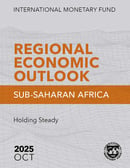This web page provides information in on the activities of the Office, views of the IMF staff, and the relations between Guinea-Bissau and the IMF. Additional information can be found on Guinea-Bissau and IMF country page, including official IMF reports and Executive Board documents in English that deal with Guinea-Bissau.
At a Glance
- Current IMF membership: 191 countries
- Guinea-Bissau joined the Fund in March 24, 1977.
- Total Quotas: SDR 28.4 Million
- Last Article IV Consultation: The 2017 Article IV consultation staff report was discussed by the Executive Board on June 17, 2022. (Country Report No. 2022/196), June 27, 2022)
Office Activities
Press Release – Guinea-Bissau: Implementing a Blockchain Solution to Improve Wage Bill Management
Bissau – May 8, 2023: A technical assistance mission led by Concha Verdugo Yepes (IMF African Department) held meetings in Bissau during April 25–May 2, 2023, to discuss progress made in the implementation of a blockchain solution to improve the transparency of the wage bill management in Guinea-Bissau.
May 8, 2023
GNB- PR May 8 2023 (português)
May 8, 2023
IMF's Work on Guinea-Bissau
No results found. Either there was an error with the web service or there is no data returned by the web service.
Regional Economic Outlook
October 16, 2025

The outlook for Sub-Saharan Africa is showing resilience, despite a challenging external environment with uneven prospects in commodity prices, still tight borrowing conditions, and a deterioration of the global trade and aid landscape.
Read the Report
Fraudulent Scam Emails Using the Name of the IMF
For more information please see Fraudulent Scam Emails Using the Name of the IMF
Departmental Papers on Africa
 The Departmental African Paper Series covers research on sub-Saharan Africa conducted by International Monetary Fund (IMF) staff, particularly on issues of broad regional or cross-country interest. The views expressed in these papers are those of the author(s) and do not necessarily represent the views of the IMF, its Executive Board, or IMF Management.
The Departmental African Paper Series covers research on sub-Saharan Africa conducted by International Monetary Fund (IMF) staff, particularly on issues of broad regional or cross-country interest. The views expressed in these papers are those of the author(s) and do not necessarily represent the views of the IMF, its Executive Board, or IMF Management.



